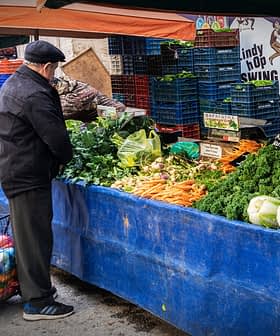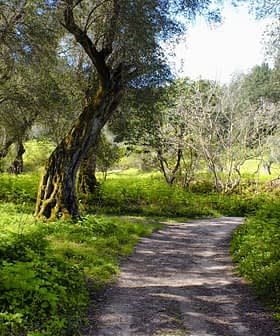Heavy Downpours Dampen Harvest Outlook in Greece
Many producing regions, especially in the western part of the country, were hit with a deluge that some farmers say is becoming more common.
While olive growers and producers are preparing for the upcoming harvesting season in Greece, several of the country’s most productive regions have been battered by heavy downpours and gusts of wind.
Severe damage, including flooded groves, broken olive trees and drupes destroyed by hail, was reported by producers in the Ionian islands, parts of the central mainland, Crete, the western Peloponnese and the Halkidiki peninsula in the north.
The recent gales and torrential rains that swept our area caused excessive destruction, hardly leaving any fruits on many of our olive trees.
The weather phenomena were especially intense in the region of Aetolia-Acarnania in central-west Greece, the largest producing territory of Kalamon table olives in the country, where farmers were confronted with storms and extremely high levels of rain.
See Also:2021 Harvest Updates“The land in our area is very fertile, and we produce top-quality olives of the Kalamon variety,” Nikolaos Kalliafas, an olive grower based in Gouries, near the delta of Acheloos River, told Olive Oil Times.
“The recent gales and torrential rains that swept our area caused excessive destruction, hardly leaving any fruits on many of our olive trees,” he added. “I am 51, and I have been in the fields since I was a little boy. I have never seen such erratic weather before.”
Kalliafas also noted that the weather-related problems in the area are nothing new but began to appear two to three years ago.
“For more than two years now, our production of edible olives has turned sour,” he said. “This season, things are worse since I am expecting to get only half of the quantity produced the previous season.”
“The decline in production is not due to the [alternate bearing] production cycle of the trees or anything else, but due to the abnormal weather which brought unusually warm days in spring and complete drought in the summer, seriously impacting the fruition of our olive trees,” Kalliafas added.
“The recent storms were just the finishing touch, and we also have to worry about the gloeosporium pathogen [also known as olive leprosy], which emerges when increased levels of humidity exist,” he continued. “We can’t apply any crop-dusting operations now since we start harvesting in five days.”
More producers in the area also described a grim situation, with their olive groves remaining underwater for several days, damaging both the olive trees and their drupes.
The farmers association of Agrinio, the largest city in the region, issued an announcement warning that hard times are still to come for local farmers and olive growers.
See Also:Greece Requests Aid for Expected Drop in Olive Oil and Table Olive Production“The local farmers have suffered another blow in their income, who are in despair after the damages previously caused by the hail and frost, and the significant losses due to the reduced fruition of the olive and citrus trees,” the announcement read. “The rural economy of our area is on the verge of extinction.”
In Crete, the impact of the bad weather on the island’s olive growers was milder. However, many farmers in the region of Heraklion were affected, especially in the areas of Monofatsi and Pediada.
Strong wind gusts and hail knocked olive fruits to the ground and inflicted damages on the branches and trunks of the trees.
“The intense hailstorms in various areas of the Heraklion district have caused great destruction in the countryside,” said Vassilis Kegeroglou, the local member of the Greek parliament. “The farmers can only count their wounds.”
Kegeroglou also called on the Ministry of Agriculture to record the damage caused by the storms and provide compensation to the affected farmers.
In terms of olive oil production, a medium yield is expected on the island, according to Vaggelis Protogerakis, the head of the association of Heraklion olive oil producers. Nonetheless, the rains proved beneficial in some areas, improving the quality of the oil.
“This year, the production [of olive oil] is expected to be reduced compared to last year,” Protogerakis said. “Some areas will have [a good yield], but in no case can we talk about strong production.”
“Quality is expected to be great after the recent rains,” he added. “However, the projection for reduced production also applies to the rest of Greece…and the rest of the member states [of the E.U.] And this makes us hope for better producers’ prices in Crete.”









